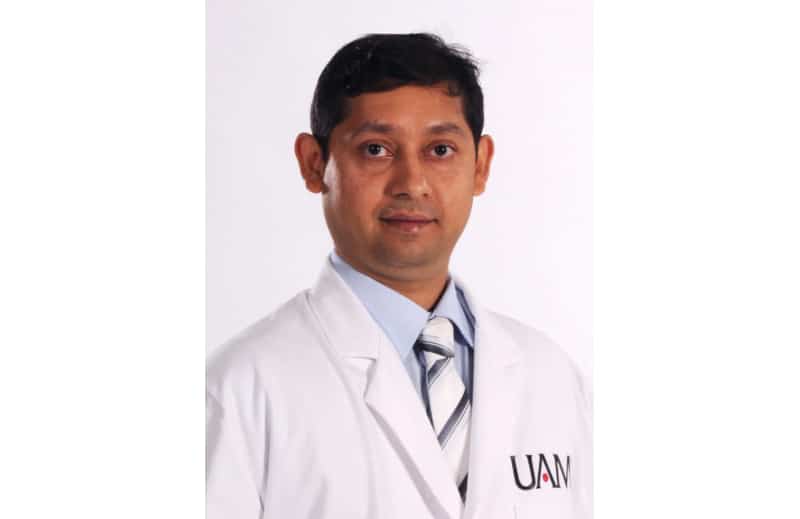UAMS Researcher Strengthens Evidence for Connection Between COVID-19 and Pancreatitis
| Patients with COVID-19 were at risk of developing pancreatitis in a study conducted by a University of Arkansas for Medical Sciences (UAMS) researcher using data from a large New York health system.
The findings support the idea that pancreatitis should be included in the list of gastrointestinal symptoms of COVID-19, something that has been discussed by the scientific community based on case reports but has not been supported by a carefully designed study such as this one.
In some individual cases, doctors have reported acute pancreatitis as the first sign of COVID-19 infection, but researchers have been unclear about widespread trends.
Sumant Inamdar, M.B.B.S., a gastroenterologist and assistant professor in the Department of Internal Medicine in the UAMS College of Medicine, published the work in Gastroenterology, one of the leading peer-reviewed journals in the field.
“Physicians had noticed this apparent connection between COVID-19 and pancreatitis but it is unclear if COVID-19 is actually causing the pancreatitis,” Inamdar said. “Our study was small, only 40 patients, but we used strict criteria and saw a strong connection. It’s the largest study on this topic to date. Our next studies will follow up and focus on what is actually causing the connection.”
COVID-19 is known to cause gastrointestinal symptoms in some cases in addition to or in absence of respiratory symptoms. Pancreatitis symptoms include stomach pain and tenderness, fever, nausea and vomiting.
Typically, pancreatitis can be connected to gallstones or alcohol in all but 33% of cases. However, in the COVID-19-positive group that Inamdar studied, 60% of the patients had pancreatitis with no obvious cause beyond the suspicion that it was likely connected to their COVID-19 infection.
In addition, African Americans and Hispanics had higher rates of the combined COVID-19 and pancreatitis diagnosis than other groups.
Patients with pancreatitis and COVID-19 were more likely to need to be on a ventilator as part of their treatment and also had longer hospital stays compared to other pancreatitis patients without COVID-19.
“Physicians should add abdominal pain to the list of symptoms they’re considering for suspected COVID-19 when they’re interviewing patients, and they should consider running the appropriate tests for pancreatitis. The public should keep this in mind as well, to be aware of more than just the respiratory symptoms,” Inamdar said. “Larger studies will be needed to confirm these findings and explore the details.”
Inamdar used patient data from March 1 through June 1 from Northwell Health System in New Hyde Park, New York, where he has been collaborating with researchers to learn more about the novel coronavirus and its effect on patients.
The study looked at patients who presented at the hospital with acute pancreatitis symptoms and were later confirmed to have COVID-19. This group was compared to a group of patients with acute pancreatitis but without COVID-19
UAMS is the state’s only health sciences university, with colleges of Medicine, Nursing, Pharmacy, Health Professions and Public Health; a graduate school; a hospital; a main campus in Little Rock; a Northwest Arkansas regional campus in Fayetteville; a statewide network of regional campuses; and eight institutes: the Winthrop P. Rockefeller Cancer Institute, Jackson T. Stephens Spine & Neurosciences Institute, Harvey & Bernice Jones Eye Institute, Psychiatric Research Institute, Donald W. Reynolds Institute on Aging, Translational Research Institute, Institute for Digital Health & Innovation and the Institute for Community Health Innovation. UAMS includes UAMS Health, a statewide health system that encompasses all of UAMS’ clinical enterprise. UAMS is the only adult Level 1 trauma center in the state. UAMS has 3,485 students, 915 medical residents and fellows, and seven dental residents. It is the state’s largest public employer with more than 11,000 employees, including 1,200 physicians who provide care to patients at UAMS, its regional campuses, Arkansas Children’s, the VA Medical Center and Baptist Health. Visit www.uams.edu or uamshealth.com. Find us on Facebook, X (formerly Twitter), YouTube or Instagram.###
